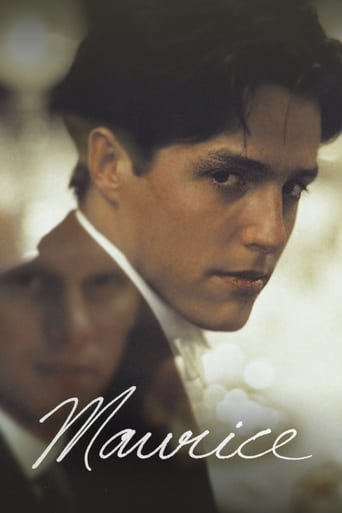Michael Neumann
Growing up gay in puritan England circa 1920 could be a very dangerous enterprise, as two young college students discover in this adaptation of E.M. Forster's suppressed, confessional novel. Of course by now it's no secret how the cloistered male community and heady, highbrow atmosphere of England's best public schools drew out "the unspeakable vice of the ancient Greeks" from much of the country's youth, but this isn't the usual timid introduction to homosexual love. Beneath the typically lush Old World settings and handsome period décor is a challenging story of one (sadly, rather bland) young man caught between the law and his libido. Platonic lover Hugh Grant has a much more interesting character; unfortunately, he all but disappears from the script after being frightened by the threat of exposure into a dull heterosexual marriage. It's up to Maurice (pronounced Morris) to carry the torch, in more ways than one, and his coming to terms with an errant (by British law) sexuality is conveyed with literate sympathy.
Mike Legentil
We all make mistakes, of course. But I felt it was my «duty» to point out at least two slight mistakes in Mr. Christopher Sullivan's (from New York City, USA) comment. I only do this so that readers won't be mislead. I mean the best to all, including Mr. Sullivan's overall accurate and well-written review ! He states (and I quote -- while making my own remarks in BOLD LETTERS): ***************************** «Maurice" (prononced "Morris") -- PRONOUNCED -- is the film adaption of the book by E.M. Forster and stated to be semi-autobiographical of his life (OF A CERTAIN PART OF HIS LIFE, NOT HIS WHOLE LIFE, AS IT IS IMPLIED). The book was banned for many years (AND FORSTER HIMSELF WANTED HIS BOOK TO BE PUBLISHED AFTER HIS DEATH, WHICH OCCURRED IN 1970) and it wasn't until 1987 (YES, IT WASN'T UNTIL THEN BUT ONLY BECAUSE THE FILM PROJECT COULD NO BE PUT TOGETHER BEFORE -- OR AFTER CENSORSHIP STARTED TO BECOME MORE «BROAD-MINDED» IN THE LATE 1960's) that this visually splendid film was released from Merchant-Ivory - ("A Room With A View", "Howard's End"). Set in early 19th century England (NO ! EARLY 20TH CENTURY !, etc.»
hughman55
I really liked this movie when I first saw it in 1987. I like it even more today. This is the story of two gay men in the early 20th Century, how they fall in love, how they fall apart, and how they eventually take very different paths. One that leads to a life of sadness and regret. The other to acceptance, love, and fulfillment. James Wilby gives a powerful performance as Maurice, a middle class gentleman who discovers his homosexuality while away for college at Cambridge University. It is there he meets and falls in love with Clive Durham, played brilliantly by Hugh Grant, an upper class gentleman who lives in a decaying English manor, called Pendersligh Park, that was built by his grandfather's grandfather. They enter into a passionate, albeit sexless, relationship that most viewers will see as doomed from the start. Maurice, once he overcomes his internal conflict over who and what he actually is, is drowning in love for Clive. Clive on the other hand, though he is in love with Maurice, is perhaps more in love with the idea of Maurice, than Maurice himself. When outside circumstances intervene, their world together comes crashing down, and the results are painful for both. One of the plot devices that I found intriguing, and not having read the book I don't know if it is part of the original story, is Simcox, Clive's butler, played menacingly and effectively by Patrick Godfrey. He informs the viewer of the disapproval and judgment directed at Maurice and Clive that IS Edwardian England. Simcox delivers even the most banal lines with an almost imperceptible sneer. Even when he has no lines he is lurking in the background of the scene with a stone cold gaze that says, "I know what you're up to." He is the warden. Edwardian England is the prison. And Pendersleigh Park is Clives cell.I missed many of the finer points of this film the first time I saw it in 1987. Back then the ending disappointed me because I identified with Maurice and I felt like he waked away with the second prize, Alec Scudder. And Clive caved to the pressures of Edwardian England and entered into a marriage he was never suited for. All of that was true then, and is still true today. However, with 20 plus years of maturation behind me I now understand that when the credits role at the end of this film Clive is as deeply in love with Maurice as he ever was. The finale of the film is a window into the lifeless, hopeless, longing, that is Clive's future, contrasted with that of the fulfillment and joy that will be Maurice's. After Clive and Maurice have their final words, Clive returns to his waiting wife inside Pendersleigh. Simcox asks, "will there will be anything else sir?", and then proceeds to close the house shutters for the night. You can almost hear the sound of cell doors closing for lights out in a penitentiary. Clive approaches his wife, who is seated in front of her vanity mirror. He leans in to kiss her cheek and they look up together into the mirror in front of them. They expect to see a happy couple. They don't. There is a sadness in Clive's eyes that they are both unprepared for. It is more shocking to Clive because now he is no longer fooling even himself. He pulls uncomfortably away from his wife and like a prisoner resigned to his confinement, he finishes closing the shutters, (the cell doors of Pendersleigh) one by one. As he comes to the last one he takes a final look out the window at freedom. Clive has chosen to accept society, and turn its turmoil toward him inward where he will always be conflicted and never know a moment of peace. Maurice has decided to accept who he is and deal with the turmoil in the world outside. It is heartbreaking. James Wilby carries this movie from start to finish. As Maurice it is his story to tell and tell it he does. From adolescent bewilderment, to revulsion with Clive's initial advances, to falling in love with Clive, then heartbreak, and finally to his own sunset to walk into. He never has a foot out of place. It is an honest and compelling performance. But it is Hugh Grant's complex and multi layered Clive that you're left with ricocheting around in your soul. When Clive says to Maurice, "It's like the good blundering creature that you are to try and comfort me, but there are limits," Grant conveys a sense of defeat, resignation, and emptiness that is almost too difficult to watch. At times he stares very far away. Probably to the place where he wishes he could be, but seems impossible to reach. I think because initially I was so personally disappointed in his characters evolution throughout the course of the movie, that I missed what a brilliant performance this was. Forgive me Mr. Grant. You are a truly talented actor.This is a brilliant film. It's all there: beautiful story, beautiful landscape cinematography, great script(small problem though with the editing and non-sequitur dialog when Scudder meets Maurice in London), great direction, perfect score, and above all two brilliant performances from James Wilby and Hugh Grant and many others in the supporting cast. This one is a must see.
skyhouse5
Having arrived, belatedly, by some 20 years, on this Ivory/Merchant classic, it strikes me as the perfect bookend for the 2004? "Brokeback Mountain." Both films are as close to "perfection" as humanly possible, and each is true and profound in its own right and style, nuance and subtexts, milieu and specifics. It will be difficult indeed for any future forays into the subject to come close to, much less equal, surpass?, not very likely, this pair of investigations of what some sociologists/psychologists in the past dubbed a "paraphilia." Yes, both films have elevated both subject and contemplation into the realm of unblinking observation, authentic perception, AND "art" as well. "Maurice" is a worthy addition to the Merchant/Ivory canon. Frank Eng









